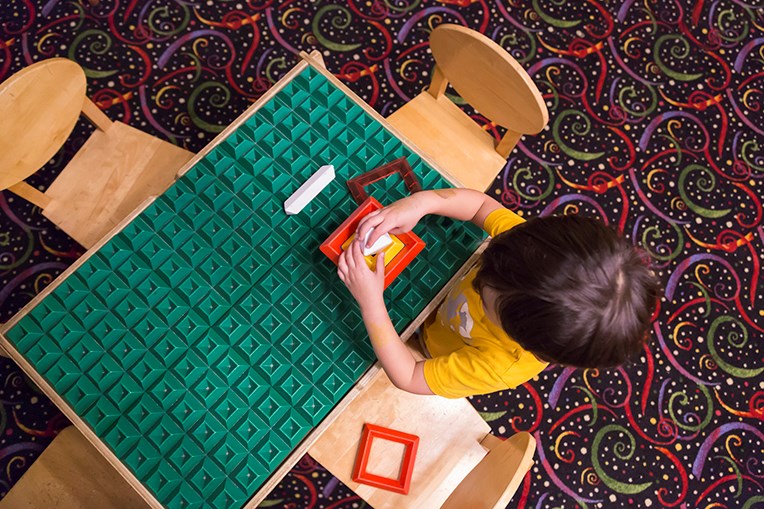Squamish children with neurodiverse needs and their families are struggling under the weight of the pandemic and its associated restrictions.
A local parent and behaviour analyst are adding their voices to a chorus across B.C. who are calling on the provincial government to better support kids on the autism spectrum and their families.
They are asking the Ministry of Children and Families to increase funding and make it more flexible.
The families of kids diagnosed with autism under the age of six may receive up to $22,000 per year for support related to their child. Families with children aged six to 18 are eligible for up to $6,000.
The $22,000 per year has to be split between the experts — behaviour consultants, speech and language — and equipment, parents note, and the drastic funding reduction comes before many children have even been diagnosed.
There is also currently a petition circulating that asks the provincial government to allow families to be able to carry over their unused portions of funding into the end of 2021 so that their children may have the funds to access core therapy services that were not available this past year due to the pandemic.
One in 66 children has been diagnosed with autism in Canada and 18,000 are receiving funding after being diagnosed in B.C., according to Autism Community Training (ACT).
Under one roof
Squamish mom Trish Lo's voice fills with pride and adoration when talking about her two young sons.
In an interview with The Chief, she expressed her gratitude for all the services and help her family has access to, but acknowledged, it has been challenging during the pandemic.
Her four-year-old son was diagnosed as being on the autism spectrum after COVID-19 hit, at the end of May.
When he was two years old, they realized he was different from his older brother.
"We just knew there was something unique about him," Lo said. "He was not the same as other children."
It took until they paid to get him assessed privately in West Vancouver, at four, to get the formal diagnosis.
The pandemic has created an upheaval of schedules, structure and routine, something that is especially challenging for neurodiverse folks.
Lo runs a busy business. When school and their daycare were unavailable, her husband was able to stay home and care for the two children, but it wasn't easy for those 3.5 months.
"Two very different children: one neuro-typical, one neuro-diverse. And how can you manage that? The older one loves to be outside riding bikes and running and jumping and playing, but the younger one has no interest in doing that. It was challenging."
They turned to screens more than they would have liked.
"We set up stations. We would have a playdough station, a water table, a little rice table and when he needed his time away, he was able to come downstairs and watch an old iPhone that I had beside me."
With an ever-changing schedule, her son has a tough time and that means the whole family has a harder time.
"As a parent, it breaks your heart. You want your kids to be — not normal — but to be happy and healthy and safe. When he is really struggling, it is really hard because we can't just flip a switch."
Lo said the pandemic means there is no break for anyone in the family. While there is a bit of respite funding, getting a suitable sitter, and following COVID-19 restrictions make it next to impossible.
They don't have family here and can't go back to the U.K. to see family, as they normally would.
"We don't get any holidays and that is a very small thing, especially for most people, but it is really big for a family who is dealing with this type of situation," she said.
Lo said she considers her family lucky in that a behaviour consultant has continued to work with their son throughout the pandemic, though not for in-home visits. They can get together outside, but that is going to be more challenging as we get deeper into winter, she said.
"You aren't seeing your team as often as you would like," she added.
Their son can only see his [interventionist] every other week.
"Ideally, it would be every week," Lo said.
She would like to see a narrowing of the funding disparity that sees families with children aged six to 18 eligible for up to $6,000 while younger kids get $22,000.
"Why is it so different?"
Many families with neurodiverse children may not have the means her family has, she noted, and she wonders how they manage.
She said there should be more flexibility with the funding.
If experts suggest equipment that is needed, a form has to be sent away and approved.
"Then we can go buy it. We submit this justification for equipment form and it can take a month to even get approved," she said.
It can be six weeks to get reimbursed for the cost of the items.
"So from the time you get the 'you should get this because it will help your child," from that moment until you have purchased and got reimbursed. It can be 10 weeks."
There needs to be more funding available for all ages and there needs to be more flexibility within that funding, especially during COVID, where it is not as easy to navigate.

<
A spokesperson with the Ministry of Children and Family Development told The Chief it continues to review options to reduce barriers for children to receive intervention services.
"We know that all families have unique needs, and we need our system to better account for those. It’s why we’re working to finalize and implement a new children and youth with special needs service framework to guide the delivery of services and better meet the specific needs of children and their families," a spokesperson said.
During the pandemic, the ministry shifted to accept virtual assessments for children under the age of 42 months and youth aged 15 to 19 years.
"This will help the BC Autism Assessment Network conduct assessments under current health and safety guidelines. While this relieves some pressure for those waiting for an autism assessment, the ministry is actively looking at what other steps we can take as well," the spokesperson said.
Regarding additional supports during the pandemic the ministry spokesperson said starting April 1, the government created an Emergency Relief Support Fund (ERSF) which provided a direct payment of $225 per month to help eligible families during pandemic. The first round of the ESRF ran from April 1 to June 30, and was distributed to about 1,300 families. A second round of ESRF was added from July 1 to Sept. 30 assisting a further 3,000 families. Flexible parameters regarding autism funding and the temporary suspension on maintenance payments for children on special needs agreements were in effect from April 1 through to Aug. 31.
Flexible use of respite funding will continue for families until March 31, 2021.
Regarding autism funding and the disparity between those under six and above, the spokesperson said that autism funding covers services and resources outside of a child’s school day. "Once children with autism start school, they also benefit from the education supports and services that are available through the school system."
Regarding unused funding during the lockdown, the ministry didn't seem to budge on allowing it to be paid forward.
"The ministry focused on helping to ensure families could use as much of their funding as possible by increasing the amount of funding that could be used to purchase eligible equipment/materials and counselling supports, and giving families more time to use their funding if they were in the process of transitioning from autism supports for children under age six to over age six and from ministry services into adult services," the spokesperson said.
"Families could also use their Emergency Relief Support Funding in a very flexible manner. Family counselling was available as an eligible expense across all age categories, and continues to be an eligible expense for the Over 6 Autism Funding Program."

<
Sylvia Hunter is a Squamish behaviour analyst with Sea to Sky Behaviour and Learning who supervises home teams with behaviour interventionists, among other duties. She also works as a liaison between home and schools.
She said on the plus side, Squamish is getting more services than it has had in the past.
"I think for the Sea to Sky in general, a lot of families in Pemberton and Whistler are having to travel to Squamish to access services," she said.
In terms of challenges due to COVID-19, she said at the start of the pandemic there was a lot of confusion around rules and funding.
And families were suddenly without many of the supports they previously had before schools and daycares shut their doors, such as educational assistants.
"You have really stressed out parents and grandparents trying to step into the role of an EA. Families just at their capacity and what they can handle in terms of supporting their kids and their academic work," she said.
There was a move to online, but not everyone was able to access that.
"That has been really been challenging for those families," she said.
There has been an increase in behaviour challenges and anxiety challenges as children with autism express more anxiety amid the confusion.
Hunter said finding skilled behaviour interventionists who can afford to live in Squamish, and being able to maintain that support is an issue the pandemic has made that more acute.
"We have interventionists from Australia or America who had to return [home] after a lot of money had been invested in training and support... and then they had to leave and everyone is back to where they started," she said.
A B.C. study
Autism Community Training (ACT) partnered with the autism and developmental disorders lab at Simon Fraser University for a survey of 238 caregivers of children with autism in B.C. asking about their experiences from March to June.
The survey, "The Impact of COVID-19 on Mental Health, Quality of Life, and Service and Support Needs in Families of Children with ASD," showed the majority of caregivers reported their child's anxiety, tantrums, routines, and sleep quality had worsened, while parents' own well-being declined and provincial supports in response to COVID-19 were insufficient to meet their needs.
The survey showed 37% of caregivers were concerned their child might physically harm another family member, while 9% had considered putting their child into government care.
Grace Iarocci, a psychology professor who directs the university's autism lab, told The Canadian Press that caregivers were already struggling with lack of supports and higher rates of depression before COVID-19 hit.
~With files from Brenna Owen/ The Canadian Press, which produced its story with the financial assistance of the Facebook and Canadian Press News Fellowship.



